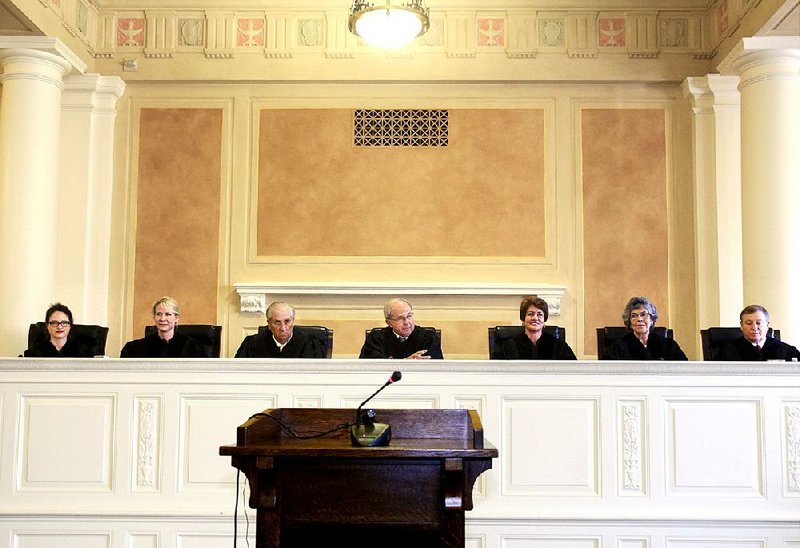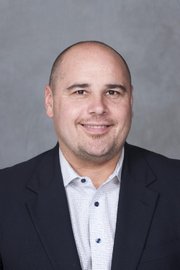Another judicial election cycle dominated by a record-breaking amount of out-of-state campaign money has prompted a meeting of the Senate's Judiciary Committee to discuss, among other things, a proposal that would end the election of Arkansas Supreme Court justices and replace it with a merit selection system.
The influx of negative ads and mailers funded by independent spending groups and "dark money" in this year's two Supreme Court races has added momentum, and immediacy, to lawmakers and legal professionals alike who want to change the way justices are added to the Supreme Court.
Sen. Jeremy Hutchinson, R-Little Rock, who called the meeting scheduled for Wednesday, is advocating for a proposal long supported by Rep. Matthew Shepherd, R-El Dorado, that would create a panel to nominate candidates to fill vacancies and leave the final decision to the governor.
Many states use a similar "merit system" process, and getting a proposal to change the state constitution to voters this fall is imperative, Hutchinson said. Arkansas is one of 21 states that elect their Supreme Court justices, according to the American Bar Association.
If a justice wants to serve another term on the court, Shepherd's proposal would then put them up for a retention vote, where citizens can simply vote "yes" or "no" on whether that justice should continue to serve.
Hutchinson said that, ideally, lawmakers can move quickly to build consensus and get a proposed amendment to the state constitution on the agenda for one of the approaching special legislative sessions. If lawmakers approved it, the measure would go before voters in November.
"I don't like holding meetings for the sake of holding meetings unless there's some issue like this that has timeliness to it," he said. "It's an important topic. ... Time is of the essence."
In 2000, voters approved Amendment 80, which ended partisan judicial races and set the terms and qualifications of its appellate courts.
The problem, though, according to Hutchinson, is that Supreme Court candidates are barred from discussing case law or politics and don't have a partisan identifier to help voters figure out who exactly they're voting for.
"There's no information by which voters can make an informed decision," Hutchinson said.
Hutchinson -- who donated to Justice Courtney Goodson's failed campaign to become chief justice, and who has worked with her husband, John Goodson, in the past -- said the results of the elections are not pushing him or others to call for a change.
Goodson, Justice-elect Shawn Womack, and several retired justices are opposed to ending the election of Supreme Court justices but agree that outside money is unduly influencing the election process.
Hutchinson's uncle, Gov. Asa Hutchinson, supports a change in the system for selecting Supreme Court justices in order to keep money and politics out of the state's top court.
On Friday, the governor said he is considering many proposals for a second special session this year that is aimed at funding for the state's highway improvements. A special session that will include proposed changes to the state's Medicaid program is to set to begin on April 6.
Medicaid reform will be the focus of a first special session, the governor said, so consideration of changes to the Supreme Court selection process would come during the second special session.
"I do support an alternative plan for selection of Supreme Court judges," Hutchinson said. "There are discussions going on, but there's nothing specific there."
Wednesday's meeting agenda states that both Goodson, who has publicly opposed ending Supreme Court elections, and Justice Karen Baker will appear to make comments.
Also on the agenda is Rep. Clarke Tucker, D-Little Rock, who has also asked the governor to add his proposed legislation -- which would regulate "dark money" and electioneering by candidates -- to a special session.
During the 2015 session, Tucker was unsuccessful in pushing through legislation that would require out-of-state groups spending money on campaign ads to register with state officials and report the source of their money.
In a campaign that saw one group, the Judicial Crisis Network, spend at least $622,435 in ads against Goodson, Tucker thinks his legislation is "ripe" for discussion.
"My hope is the ethics reform package would merit the call [by the governor]," Tucker said. "The reason why I proposed it ... is so [new campaign finance laws] could be in place for this election cycle in November; that's another factor affecting the timing of this discussion."
Sen. Hutchinson said he is still supportive of Tucker's legislation -- and is receptive to debating it at a special session -- but he thinks change in judicial elections is more of a priority.
"The urgency isn't there [for Tucker's proposal] because that just requires a statutory change that could be done in the 2017 session and be in effect by 2018," Hutchinson said. "But changing the way we select judges and justices has to be on this ballot, so if we waited, it wouldn't be on the ballot until 2018, and wouldn't go into effect until the 2020 election cycle."
On Friday, Gov. Hutchinson said that Tucker's proposal is one of many that are being considered for a later special session but that everything will depend "on the success" of the session discussing the state's Medicaid expansion.
A Section on 03/28/2016
Reader poll
Which method do you prefer for selecting Arkansas Supreme Court justices?
- Election
- Merit selection system
64 total votes.

